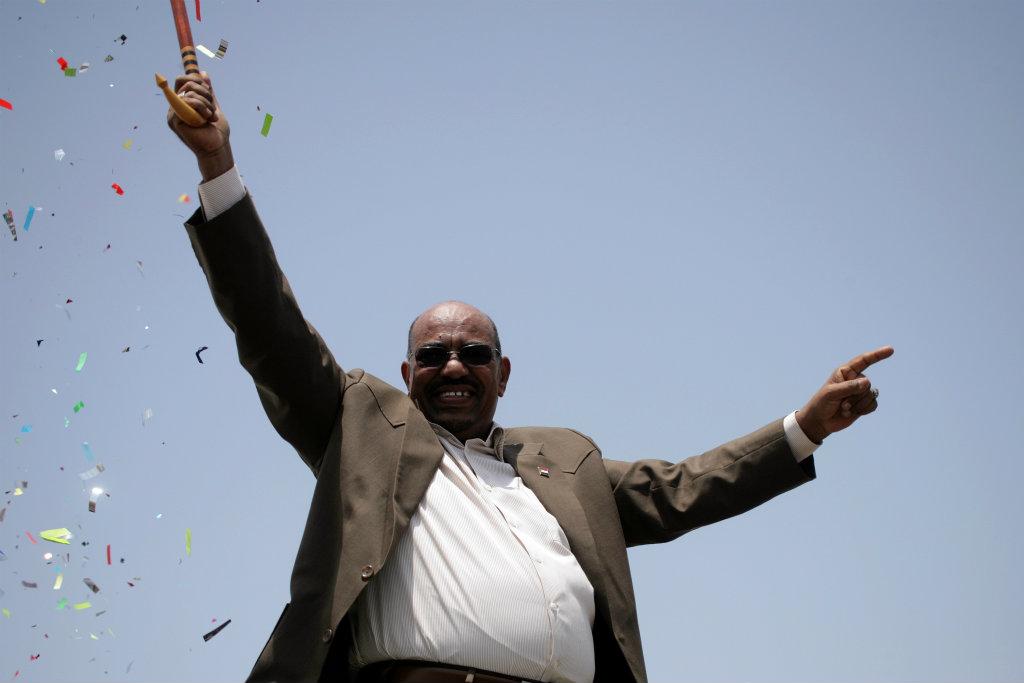Why does the world allow Sudan’s Bashir to target civilians?
Sudanese President Omar al-Bashir waves to the crowd as he attends for the inauguration of the White Nile Sugar factory.
WASHINGTON — Have you heard of Sudan’s President Omar al-Bashir?
He is, perhaps, best known as the only sitting head of state wanted by the International Criminal Court, or ICC, for the commission of crimes against humanity and genocide. The story of Bashir’s reign of terror in Sudan, however, began much earlier than the conflict in Darfur, and continues today.
Bashir and his National Congress Party, or NCP, have ruled Sudan since 1989, following a bloodless coup that came amidst the country’s second civil war. That conflict pitted Sudan’s government against rebel forces in the south, cost more than 2 million lives, and displaced another 4 million civilians, largely from the country’s southern regions. Throughout the 1990s and early 2000s, Bashir’s forces perpetrated atrocities against civilians, primarily in southern Sudan and in the Nuba Mountains. Converted Antonov cargo planes, which have no munitions guidance systems, indiscriminately dropped oil-drum bombs on civilians throughout the south and the Nuba Mountains, while Bashir’s regime denied humanitarian aid agencies access to hundreds of thousands of civilians.
A 2005 peace agreement between the NCP and its southern foes left Bashir in power, despite the government’s brutal tactics during the civil war and mounting evidence that the Sudanese military and government-backed militias, commonly known as the Janjaweed, were committing heinous crimes against Sudanese civilians in Darfur. Their tactics again included the indiscriminate bombardment of civilians and restrictions on international humanitarian access. By 2008, the United Nations estimated that between 200,000 to 300,000 people had died in Darfur and 2.7 million more had been displaced.
While the ICC issued arrest warrants against Bashir and three other regime officials, including Ahmad Muhammad Harun and Abdel Raheem Muhammad Hussein, Bashir remained in office. Meanwhile, Harun became governor of South Kordofan state, which includes the Nuba Mountains, and Hussein became Minister of Defense.
More from GlobalPost: Sudan: Will riots bring down President Omar al-Bashir?
Since June 2011, Bashir, along with Harun and Hussein, among others, has led an inhuman campaign against Sudanese civilians in the Nuba Mountains, many of whom survived the civil war only to find themselves, some six years later, again targets of their government’s brutality.
Today, the Sudanese military and government-backed militias are again dropping bombs from Antonovs onto civilians in the Nuba Mountains and in Blue Nile state, where the Sudan People’s Liberation Army-North, or SPLA-N, and other rebel forces from Darfur are engaged in another uprising against Bashir’s government. As in the north-south civil war and the Darfur conflict, Bashir’s regime deliberately targets civilians, attempting to eradicate anyone suspected of supporting the rebels through either extermination or displacement.
Bashir and his cohorts’ tactics are again proving alarmingly effective. According to the UN, some 700,000 civilians have been internally displaced or are severely affected by the conflict in the Nuba Mountains and Blue Nile state, and at least 200,000 more have fled to refugee camps in South Sudan and Ethiopia.
Meanwhile, peaceful protesters in Sudan’s capital, Khartoum, angered by the Bashir regime’s policies, have taken to the streets to call for a change in government. The response from Sudan’s police and security forces has been brutal. Unconfirmed reports trickling out of Khartoum indicate that hundreds, if not thousands, of protesters are currently being detained. Released protesters speak of torture at the hands of Sudan’s police and security forces.
While the world’s leaders continue to under-react to Bashir’s crimes against his own people, there are actions that we, as the international community, can take to help bring justice to the people of Sudan.
We can encourage the African Commission on Human and Peoples’ Rights, at its extraordinary session that begins on July 31, to accept the Enough Project’s communication against the government of Sudan. The communication alleges that the government of Sudan’s indiscriminate aerial bombardment of civilian populations in the Nuba Mountains and Blue Nile, its ground attacks against these populations, and its blockade of international humanitarian aid to the two areas violate, among other things, the rights to life and property afforded all Sudanese citizens under the African Charter on Human and Peoples’ Rights. While the Commission’s acceptance of Enough’s communication will not bring immediate relief to the victims of the Bashir regime’s criminal tactics, it will demonstrate the international community’s unwillingness to stand by while Bashir commits yet further crimes against the people of Sudan.
More from GlobalPost: Sudan police fire tear gas at hundreds of protestors
Jennifer Christian is a Sudan Policy Analyst at the Enough Project in Washington, DC, whose mission is to end genocide and crimes against humanity. James Bair is an attorney at the Washington, DC office of Brown Rudnick LLP.
The story you just read is accessible and free to all because thousands of listeners and readers contribute to our nonprofit newsroom. We go deep to bring you the human-centered international reporting that you know you can trust. To do this work and to do it well, we rely on the support of our listeners. If you appreciated our coverage this year, if there was a story that made you pause or a song that moved you, would you consider making a gift to sustain our work through 2024 and beyond?
